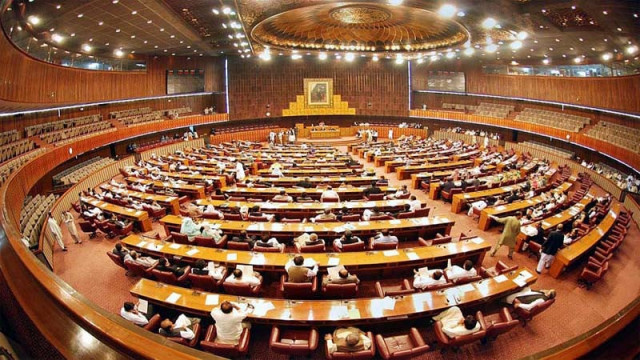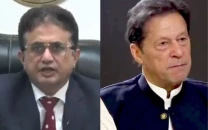Govt’s own senators oppose mini-budget
House sends its recommendations to NA; minister says PM to announce austerity measures

Senators on the treasury benches sided with the opposition on Friday in criticising the mini-budget as they sent their recommendations to the National Assembly for incorporation in the Finance (Supplementary) Bill, 2023.
During the session, the government said that Prime Minister Shehbaz Sharif would announce major austerity measures in all government institutions to control the fiscal deficit by minimising the government expenditures.
The house, which met here with Chairman Sadiq Sanjrani in the chair, approved the recommendations of the relevant standing committee on the bill. The recommendations were presented by Sadia Abbasi, on behalf of committee chairman Saleem Mandviwala.
In their speeches, the opposition rejected the finance bill and demanded its withdrawal. They proposed to the government to take some bold decisions and implement austerity measures to cut its expenditures in order to steer the country out of the economic crisis.
Opposition leader Shahzad Waseem said that the rulers had closed corruption cases involving Rs1,100 billion and the Pakistani people were bearing the brunt of it. He expressed the fear that the new budgetary measures would stoke inflation.
“The government should adopt austerity measures to cope with burgeoning inflation and ailing economic conditions, besides reforming the tax collection department [The Federal Board of Revenue (FBR)],” he said.
He urged the government to continue the programmes initiated by the previous regime for the less-privileged segments of the society. He also proposed fresh elections to get the country out of the prevailing economic crisis.
Senator Mushtaq Ahmad Khan of the Jamaat-e-Islami (JI) said that the tough conditions, imposed by the International Monetary Fund (IMF), would cause problems, particularly for the poor masses, which needed to be reviewed.
He called for reducing the federal cabinet size to 27 ministers, in addition to curtailing their perks and privileges. He also called for a full review of the bureaucratic setup in order to avoid extra financial burden on the national exchequer.
Mohsin Aziz of the Pakistan Tehreek-e-Insaf (PTI) said that Rs170 billion taxes proposed in the supplementary bill would be collected in just four months, while its effect would rise to Rs510 billion by the end of the fiscal year.
Awami National Party's (ANP) Hidayatullah Khan and Tahir Bizinjo of the National Party (NP) said that the mini-budget would increase financial burden on the poor people. They also stressed the need for reducing the cabinet size.
Kamil Agha of the Pakistan Muslim League-Quaid (PML-Q) said that the increase in the sales tax rate would directly affect the poor people because it would be levied on the items of daily-use.
Taking part in the debate, Law Minister Azam Nazir Tarar hit back at the previous PTI government, saying that the new supplementary bill was “actually written” during the previous four years” of the PTI’s tenure in the government.
“Who signed the agreement with the IMF on oil levy? Who signed the agreement with IF on electricity tariff? Who made the State Bank policy and markup?,” he asked the PTI lawmakers. “This finance bill is what you wrote during your time.”
Austerity measures
Minister of State for Finance Dr Ayesha Ghous Pasha told the house that Pakistan Democratic Movement (PDM) government was acting on the agreement made by the PTI government with the IMF.
Dr Pasha added that Prime Minister Shehbaz Sharif had formed a commission to finalise the austerity measures and he himself would announce them when the recommendation were finalised.
Referring to the finance bill, she said that the government had no option but to take tough decisions. "No doubt inflation is high and the people are extremely worried but the point is that this is the time to make structural adjustment ", she added.
However, she said that to safeguard the extremely poor segment of the society from the inflationary shocks, the government had decided to raise the allocation for Benazir Income Support Programme (BISP) by Rs40 billion to Rs400 billion.
She added that the recently increased tariffs in electricity and gas sectors would not apply to the small consumers. She called upon the political parties and other stakeholders to support the government to bring the country out of economic crisis.
(With input from APP)



















COMMENTS
Comments are moderated and generally will be posted if they are on-topic and not abusive.
For more information, please see our Comments FAQ